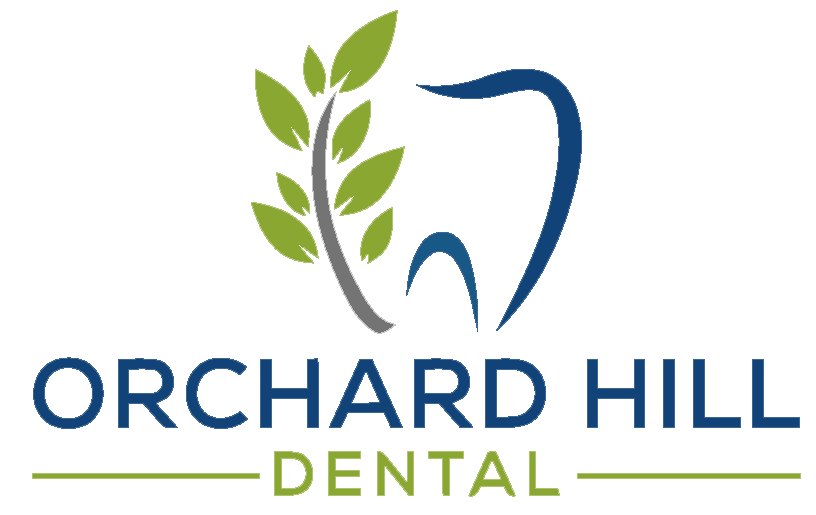Dr. Jessica Christy, our dentist in Hendersonville, and her dental team provide comprehensive and comfortable dental services to patients in the Hendersonville, NC area. We emphasize the importance of general dental care and routine visits for a healthy and stable smile at Orchard Hill Dental.
Keeping the teeth and gums healthy is the focus of general dentistry and preventive dental care. Our dentist in Hendersonville and the professional dental team take the time to get to know each patient individually to provide dental care personalized to their unique needs and goals.

Dental Care in Hendersonville, NC
We offer a variety of general dental services in our office.
Custom Mouthguard
Do you play contact sports? Custom mouthguards can help protect you from sports-related injuries and prevent teeth from chipping or cracking. Additionally, a custom mouthguard can prevent concussions, reduce stress on the neck, protect the jaw from trauma, and allow the user to speak and breathe properly.
Dentistry for Seniors
As we age, multiple oral health problems can arise, including dry mouth, root decay, darkened tooth enamel, tooth loss, and gum disease. These problems impact not only the health of our teeth and gums but our physical health as well. Orchard Hill Dental offers dental services for seniors specific to each patient who visits our office, regardless of age.
Emergency Dentistry
Our professionals can help treat your dental emergency, whether you chipped or lost a tooth, need a replacement crown, or need relief from tooth pain. Call our office for emergency tooth extraction, restorative treatment, periodontal therapy, or root canal treatment. If you have any questions about your treatment options, our dental staff will be happy to help. Dr. Christy will work with you every step of the way to ensure that you are receiving effective and comfortable treatment.
Laser Dentistry
Our dentists provide gum disease treatment and contouring using the latest in laser dentistry. We utilize a soft tissue and diode laser to remove bacteria from gum pockets. We also treat patients who want to address their “gummy smiles.”
Sedation Dentistry
Is dental fear or anxiety keeping you away from the dentist? Sedation dentistry is a simple way to have a pain-free and stress-free visit to the dentist. Minor or complex dental concerns can be addressed with sedation and used for all types of patients.
Tooth Extraction
Teeth may be extracted due to overcrowding, extensive tooth decay, impacted wisdom teeth, or periodontal disease. Tooth extraction can help remove oral health problems at the source in severe cases where teeth are no longer healthy. Restorative solutions like dental implants, dental bridges, dentures, and partials can replace missing teeth after extraction.
The Importance of Preventative Care
Preventative care is a crucial part of your oral health. You must perform it both at home and with regular visits to your dentist office. If you only participate in one of these parts, you’re still at high risk for oral health conditions. At home, brush and floss your teeth at least twice daily. This prevents food particles and bacteria from building up on your teeth. If possible, do this after every meal.
But even if you’re doing everything right at home, you can still be at high risk. There are areas in your smile you can’t clean with your at-home tools. Specialized dental tools are the only thing that can reach some places in your teeth. Regular dental cleanings allow us to clean these places. We scrape off any plaque and tartar buildup in those hard-to-reach areas.
Cleaning isn’t the only service you get at regular office visits. We perform a thorough oral exam as well. Conditions like gum disease and oral cancer have early warning signs that you can easily miss at home. With training and diagnostic tools in our office, we’re more capable of catching these issues. Catching them early means providing less expensive and less invasive patient treatment.
We also monitor your mouth’s progress and development. Young adults have their wisdom teeth growing in, and many want to correct crooked teeth. Regular checkups allow us to keep track of any new developments and ensure you’re happy with your smile.
Your Diet and Oral Health
Preventative care extends to your diet, too. Diet has a huge impact on your oral health. Foods that are high in sugar or acid are the most dangerous for your smile. Acid eats through the protective layer of enamel on the outside of your teeth. Sugar attracts harmful bacteria, that emit an acidic byproduct when they feed on sugar. This then burns through that enamel layer, too. Foods like bread and pasta break down into sugars as you digest them. It isn’t just sweet snacks that causes problems.
Your gums and teeth require certain nutrients to ensure they stay functioning properly. Dairy products like yogurt and milk provide much-needed calcium. It strengthens your tooth enamel and helps remineralize teeth. Vitamins C and D are important, too. Vitamin D helps your body asorb calcium better, while Vitamin C produces proteins that prevent gum disease.
Foods rich in fiber, like celery and apples, are beneficial. When you chew them to break them down, they take awhile, so your mouth makes more saliva. Saliva washes away food particles and helps to neutralize the acids in your mouth from foods. The texture of these fruits and vegetables almost act like little toothbrushes, cleaning around your teeth.
Staying hydrated is one of the most important things you can do for your oral health. Dry mouth comes with age, certain medications, and more factors. Dry mouth increases your chances of tooth decay and gum disease. You want to keep your mouth hydtrated and saliva produced to help wash away troubles in your smile.
General Dentistry FAQs
General dentists perform preventative healthcare services to keep your smile healthy. Learn more by reading the answers to these frequently asked questions.
Can a regular dentist pull a tooth?
Yes, a regular dentist can pull a tooth. A tooth extraction is one of the most common procedures that dentists perform. Depending on the complexity of the extraction, your dentist may refer you to an oral surgeon if they deem it necessary. But in most cases, a regular dentist can handle tooth extractions without referring to an oral surgeon.
In most cases, tooth extraction involves numbing the area with a local anesthetic before using special instruments to loosen and remove your tooth. After tooth extraction, your dentist will provide aftercare instructions to promote healing and reduce discomfort.
Can a general dentist do root canals?
Yes, a general dentist can perform root canal procedures. Dentists perform root canal treatments to treat or save a tooth that has become infected or inflamed in the pulp. However, in some cases, your dentist may refer you to an endodontist (a specialist in root canals). An endodontist specializes in diagnosing, preventing, and treating diseases and injuries of the tooth’s pulp and surrounding tissues.
Is sedation dentistry safe for senior citizens?
Sedation dentistry can be safe for senior citizens, but it is important to consult a dentist to determine if it is appropriate for the individual patient. The dentist will factor in the patient’s overall health, medical history, and the procedure the dentist or oral surgeon will perform.
The specific form of sedation used will depend on the patient and their overall health and medical history. In some cases, a senior citizen may be unable to tolerate certain types of sedation or require a lower dosage. Follow the dentist’s instructions and have someone accompany the patient to and from the appointment.
What does a dentist classify as a dental emergency?
A dental emergency is a situation that requires immediate attention from a dentist. This can include severe toothaches, painful infections, trauma (such as a fractured tooth), severe bleeding, a lost or loose filling, or other instances that may be potentially damaging to the patient’s oral health. It is important to seek prompt treatment for dental emergencies to prevent the condition from worsening or causing more severe problems.
Are lasers in dentistry safe?
Yes, lasers in dentistry are incredibly safe because of the advanced technology dentist use. Lasers are minimally invasive and allow for more precise treatment than traditional dentistry methods, removing less tissue and resulting in fewer complications. The American Dental Association approves the use of lasers for some dental procedures. Furthermore, laser therapy often results in faster recovery times and reduced need for anesthesia compared to other dental treatments.
How long does it take to recover from a tooth extraction procedure?
Recovery time after a tooth extraction procedure can vary depending on the individual and the complexity of the extraction. It takes 3-7 days for the initial swelling to subside and 7-10 days for the extraction site to heal. It’s also common for patients to experience some pain and discomfort for a few days after the procedure. However, please follow the post-operative instructions that your dentist or oral surgeon provides, including taking medications and eating soft foods while avoiding brushing near the extraction site.
Contact Your Dentist in Hendersonville, NC
Do you need a sports mouthguard? Maybe you’ve noticed your gums bleed when you brush your teeth. Call your dentist in Hendersonville, NC today for professional dental solutions, including mouthguards and gum disease treatment, at (828) 247-7001. We will work with you every step of the way to make sure that treatment is comfortable and runs smoothly.
